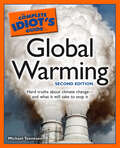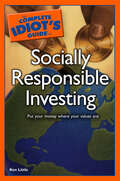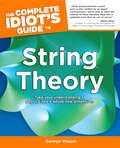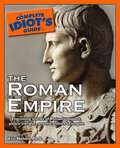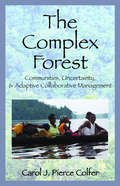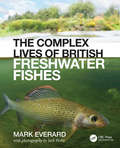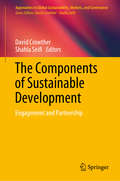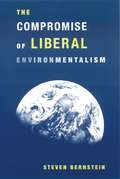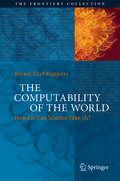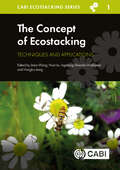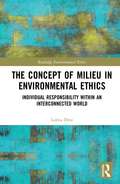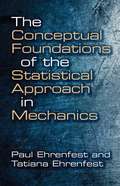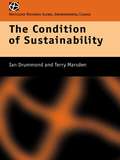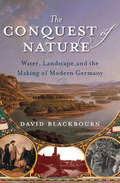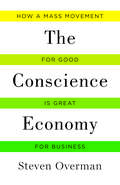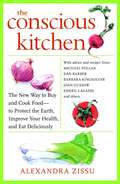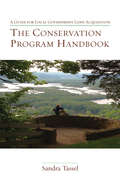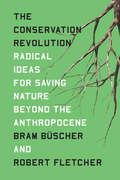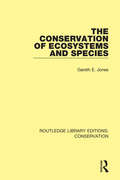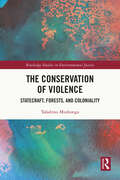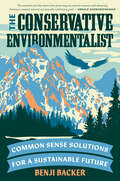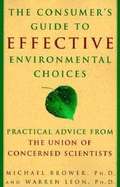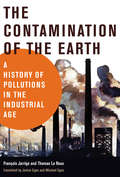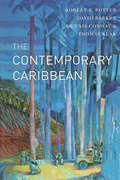- Table View
- List View
The Complete Idiot's Guide to Global Warming, 2nd Edition: Hard Truths About Climate Change—and What It Will Take to Stop It
by Michael TennesenRevisiting the most important topic of our time The rapid warming of the Earth's climate has been a concern for decades. Though many of us understand that temperatures will-on average-rise, the science and the resulting social, economic, and political implications of such a change are far-reaching and complex. This new edition has been completely overhauled, synthesizing the latest information into an easy–to–read reference that provides a fair assessment of climate change, its costs, and even its short-term benefits.• Covers the newest science and issues surrounding global warming• Written by a seasoned science/nature journalist
The Complete Idiot's Guide to Socially Responsible Investing
by Ken LittleToday's hottest investing trend. More than ever, people want their money investments to reflect their personal or political leanings. But how do they find out which companies are "socially responsible?" Do these "green" investments perform as well as traditional investments? How can they protect themselves from mutual funds or 401Ks that are managed without the future in mind? All these questions and more are answered by an international expert who founded the SRI World Group, one of the largest information services on SRI. Includes detailed information about SRI, its history and where it's headed Explains the criteria used to evaluate a company's level of social responsibility Compares performance of SRI to traditional investments
The Complete Idiot's Guide to String Theory: Take Your Understanding of Physics into a Whole New Dimension!
by George MusserWe&’re living in the midst of a scientific revolution that&’s captured the general public&’s attention and imagination. The aim of this new revolution is to develop a &“theory of everything&”—a set of laws of physics that will explain all that can be explained, ranging from the tiniest subatomic particle to the universe as a whole. Here, readers will learn the ideas behind the theories, and their effects upon our world, our civilization, and ourselves.The Complete Idiot&’s Guide® String Theory explains how this exciting idea holds up against competing theories. In this Complete Idiot&’s Guide®, you get:• Clear explanation of quantum mechanics, Einstein&’s theories of relativity, and how string theory unites them. • A quick, easy-to-understand overview of competing theories and how they might be tested.• Fast facts about black holes, what&’s inside them, how they&’re made, and why they&’re so paradoxical. • Simple, smart tips to help you visualize extra dimensions.
The Complete Idiot's Guide to the Roman Empire
by Eric NelsonYou&’re no idiot, of course. The battle scenes in Gladiator had you on the edge of your seat and wondering where you could find more information on the rise and fall of ancient Rome. But so far, your search has left you feeling like a blundering barbarian.Pick yourself up off the coliseum floor! Consult The Complete Idiot&’s Guide® to the Roman Empire—a fun–to–read introduction to the fascinating history, people, and culture of ancient Rome. In this Complete Idiot&’s Guide®, you get:• The history of the Roman Empire&’s rise and fall.• An idiot-proof introduction to the great epic literature of the Roman Republic.• A survey of the Romans in arts and popular culture.• Fascinating details of some of history&’s most nefarious emperors, including Nero, Caligula, and Commodus.
The Complex Forest: Communities, Uncertainty, and Adaptive Collaborative Management
by Carol J. Pierce ColferThe Complex Forest systematically examines the theory, processes, and early outcomes of a research and management approach called adaptive collaborative management (ACM). An alternative to positivist approaches to development and conservation that assume predictability in forest management, ACM acknowledges the complexity and unpredictability inherent in any forest community and the importance of developing solutions together with the forest peoples whose lives will be most affected by the outcomes. Building on earlier work that established the importance of flexible, collaborative approaches to sustainable forest management, The Complex Forest describes the work of ACM practitioners facing a broad range of challenges in diverse settings and attempts to identify the conditions under which ACM is most effective. Case studies of ACM in 33 forest sites in 11 countries together with Colfer's systematic comparison of results at each site indicate that human and institutional capabilities have been strengthened. In Zimbabwe, for example, the number of women involved in decisionmaking soared. In Nepal, community members detected and sanctioned dishonest community elites. In Cameroon and Bolivia, learning programs resulted in better conflict management. These are early results, but a wide range of recent research supports Colfer's belief that these new capabilities will eventually contribute to higher incomes and to sustainable improvements in the health of forests and forest peoples. The Complex Forest reinforces calls for change in the way we plan conservation and development programs, away from command-and-control approaches, toward ones that require bureaucratic flexibility and responsiveness, as well as greater local participation in setting priorities and problem solving.
The Complex Lives of British Freshwater Fishes
by Mark EverardThis stunningly illustrated book goes far beyond a run-of-the-mill nature guide. It explores the fascinating life histories of Britain’s freshwater fishes, a group of animals which, despite their importance and ubiquity in our diverse still and flowing fresh waters, has before now been rarely regarded and respected as 'wildlife'. Our native fishes tend generally to be considered as simply something for anglers to catch or for people to eat, yet they work enormously hard for us. Author Mark Everard, avid nature-watcher, angler and scientist, shows how freshwater fish provide food, ornamentation, sport and cultural identity, and highlights their huge importance for conservation as part of the living ecosystems upon which we all depend. He dives into the mysteries moving below the surface of our rivers and lakes, bringing the wonderful and fascinating world of the diversity of British freshwater fish species into plain sight and into mind. This unique book features over 100 full-colour photographs by pioneering photographer and filmmaker Jack Perks, whose work has featured on BBC Springwatch, The One Show and Countryfile. The book is filled with technical detail useful to conservationists and biology students. Most importantly, it is also presented in an accessible, visually attractive and engaging manner that will appeal to anybody with an interest in the natural world: the conservation-minded public, the angling community, and our nation of wildlife enthusiasts. Whatever your background, this book will open your eyes to our freshwater fishy wealth, and the many ways in which it enriches our lives.
The Components of Sustainable Development: Engagement and Partnership (Approaches to Global Sustainability, Markets, and Governance)
by David Crowther Shahla SeifiThis book focuses on the application of sustainable development principles through consultation with, and partnerships between commerce and the community. Offering international perspectives, the authors show that the issues are global and that we can best arrive at solutions through a synthesis of these various perspectives. The book also examines changes to corporate and institutional behavior and discusses the extent to which the focus has changed, making it necessary to consider new approaches to our understanding of sustainability and differing effects in practice.This approach is based on the tradition of the Social Responsibility Research Network, which in its 17-year history has sought to broaden the discourse and to treat all research as inter-related and relevant to business. This book consists of the best contributions from the 17th International Conference on Corporate Social Responsibility and 8th Organisational Governance Conference, held in Bangalore, India in September 2018
The Compromise of Liberal Environmentalism
by Steven BernsteinThe most significant shift in environmental governance over the last thirty years has been the convergence of environmental and liberal economic norms toward "liberal environmentalism"—which predicates environmental protection on the promotion and maintenance of a liberal economic order. Steven Bernstein assesses the reasons for this historical shift, introduces a socio-evolutionary explanation for the selection of international norms, and considers the implications for our ability to address global environmental problems.The author maintains that the institutionalization of "sustainable development" at the 1992 United Nations Conference on Environment and Development (UNCED) legitimized the evolution toward liberal environmentalism. Arguing that most of the literature on international environmental politics is too rationalist and problem-specific, Bernstein challenges the mainstream thinking on international cooperation by showing that it is always for some purpose or goal. His analysis of the norms that guide global environmental policy also challenges the often-presumed primacy of science in environmental governance.
The Computability of the World: How Far Can Science Take Us? (The Frontiers Collection)
by Bernd-Olaf Küppers Paul WoolleyIn this thought-provoking book Küppers, an internationally renowned physicist, philosopher and theoretical biologist, addresses a number of science's deepest questions: Can physics advance to the origin of all things and explain the unique phenomena of life, time and history? Are there unsolvable enigmas of the world? How did life originate? Is language a general phenomenon of Nature? What is time? Is it possible to express the history of the world in formulae? Where is science leading us? These and other provocative questions essential for a deeper understanding of the world are treated here in a refreshing and stimulating manner.
The Concept of Ecostacking: Techniques and Applications (Ecostacking Series)
by James D Blande Heikki M.T. Hokkanen Jarmo K Holopainen Tomislav Cernava Xian Wang Dr Ingeborg Menzler-Hokkanen Fanny Boerave Dr Daniel Carrillo Xiaoyulong Chen Wen-Qiang Chu Gloria Gauthura Severin Hatt Fathiya Khamis Pål Kvello Guang-Yun Li Dr Yaying Li Beatrice Muriithi Jinzhi Niu Levi Ombura Ziying Wang Qiu Yang Wei Yixia Wu Li Ya-Ying Kaijun ZhangEcostacking is a new concept and approach which aims to maximize the benefits of ecosystem service providers in cropping systems to help achieve the goal of long-term sustainable agriculture and food production. The term "ecostacking" means combining synergistically the beneficial services of functional biodiversity from all levels and types. It is a comprehensive approach, where the various ecosystem service providers are fully integrated with the rest of the cropping system including agronomic practices. It is an approach which goes beyond conventional Integrated Pest Management practises, and attempts to take advantage of all the functional biodiversity of a system. The main focus of ecostacking is on maximizing ecosystem services for biological control and pollination from beneficial arthropods, but the approach also utilizes other invertebrates (e.g., earthworms) as well as beneficial vertebrates such as bats, birds and small mammals. Microbes also provide invaluable ecosystem services including pest, disease, and weed control, either directly as components of "suppressive soils" or as plant colonizers (as endophytes or as epiphytic microbial flora). The ecostacking approach also aims to maximize other nature-provided services such as maintenance of soil health and nutrient cycling. The Concept of Ecostacking is the first book in a series which introduces ecostacking concepts to the reader and explores how this approach can be used in a variety of ways and in different cropping systems. The book defines this new concept and shows, using illustrative case studies from around the world, how ecostacking principles can be successfully employed in cropping systems in the open field, in greenhouses and in forestry. This book: · will serve as inspiration for developing further applications of this breakthrough technology for sustainable agricultural production. · is a must-read for everyone with an interest in developing sustainable crop protection systems and ecosystem management. · has been written and edited by the world's leading experts in this new and exciting endeavour.
The Concept of Milieu in Environmental Ethics: Individual Responsibility within an Interconnected World (Routledge Environmental Ethics)
by Laÿna DrozThe Concept of Milieu in Environmental Ethics discusses how we can come together to address current environmental problems at the planetary level, such as climate change, biodiversity loss, transborder pollution and desertification. The book recognises the embedded individual sociocultural and environmental contexts that impact our everyday choices. It asks, in this pluralism of worldviews, how can we build common ground to tackle environmental issues? What is our individual moral responsibility within the larger collaborative challenge? Through philosophical reasoning, this book pragmatically addresses these questions and builds a framework to support sustainable ways of living. At the core of the book, it draws on the concept of milieu (fūdo) inspired by the Japanese philosopher Watsuji Tetsurō, which captures how we act within and perceive our surroundings as a web of culturally, historically and geographically situated meanings and values. It argues that the milieu connects us as individuals with community, past and future history, and the natural world, providing us with common ground for global environmental ethics. This book will be an engaging and interesting read for scholars, researchers and students in environmental ethics, philosophy and sustainability.
The Conceptual Foundations of the Statistical Approach in Mechanics (Dover Books on Physics)
by Paul Ehrenfest Tatiana EhrenfestIn this concise classic, Paul Ehrenfest - one of the twentieth century's greatest physicists - reformulated the foundations of the statistical approach in mechanics. Originally published in 1912, this classic has lost little of its scientific and didactic value, and is suitable for advanced undergraduate and graduate students of physics and historians of science.Part One describes the older formulation of statistico-mechanical investigations (kineto-statistics of the molecule). Part Two takes up the modern formulation of kineto-statistics of the gas model, and Part Three explores W. B. Gibbs's major work, Elementary Principles in Statistical Mechanics and its coverage of such topics as the problem of axiomatization in kineto-statistics, the introduction of canonical and microcanonical distributions, and the analogy to the observable behavior of thermodynamic systems. The book concludes with the authors' original notes, a series of useful appendixes, and a helpful bibliography.
The Condition of Sustainability
by Ian Drummond Terry MarsdenThis book examines the political economy of sustainable development. The authors consider why most approaches to sustainable development have proved inadequate. Bringing together key ideas from social theory, food regimes and sustainability debates, the book presents a new and more dynamic way of thinking about sustainable development and a methodology for applying these ideas. Case study material focuses on the food system particularly the sugar industry in Australia and Barbados.
The Conquest of Nature: Water, Landscape, and the Making of Modern Germany
by David Blackbourn"Brilliantly conceived....[A] tour de force in historical writing."--Ian Kershaw Majestic and lyrically written, The Conquest of Nature traces the rise of Germany through the development of water and landscape. David Blackbourn begins his morality tale in the mid-1700s, with the epic story of Frederick the Great, who attempted--by importing the great scientific minds of the West and by harnessing the power of his army--to transform the uninhabitable marshlands of his scattered kingdom into a modern state. Chronicling the great engineering projects that reshaped the mighty Rhine, the emergence of an ambitious German navy, and the development of hydroelectric power to fuel Germany's convulsive industrial growth before World War I, Blackbourn goes on to show how Nazi racial policies rested on German ideas of mastery of the natural world. Filled with striking reproductions of paintings, maps, and photographs, this grand work of modern history links culture, politics, and the environment in an exploration of the perils faced by nations that attempt to conquer nature.
The Conscience Economy: How a Mass Movement for Good is Great for Business
by Steven OvermanA generation of people around the world, from Boston to Bangkok, from New York to New Delhi, are making everyday choices in ways that defy traditional logic. They are judging where and how their clothes were made, not just how they fit. They are thinking global but buying local. They are spending their money and their time, forming loyalties, casting votes and even enjoying entertainment based increasingly upon their desire to make a positive impact on others and the world around them. This new generation believes they can and must make the world better, and they expect business and government to get with the program.The implications of the Conscience Economy are not "soft." Ignore it, and your consumer or voter base will rebel, using a host of free tools and cheap connectivity to spread their rejection to peers around the world in real time. Leverage it, and Conscience Culture is a wellspring of financial upside. The Conscience Economy is the must-read guide to this unprecedented shift in human motivation and behavior. Author Steven Overman provides context, inspiration and some basic tools to help readers reframe how they evolve and grow whatever it is they lead--whether it's a community, a business, a product, or a marketing campaign. From the boardroom to the startup loft, from the State Department to the pulsing marketplaces of the developing world, The Conscience Economy will help international leaders, influencers, investors and decision-makers to manage, innovate and thrive in a new world where "doing good" matters as much as "doing well."
The Conscious Kitchen: The New Way to Buy and Cook Food - to Protect the Earth, Improve Your Health, and Eat Deliciously
by Alexandra ZissuYour everyday food choices can change the world--and make meals taste better than ever For anyone who has read The Omnivore's Dilemma or seen Food, Inc. and longs to effect easy green changes when it comes to the food they buy, cook, and eat, The Conscious Kitchen is an invaluable resource filled with real world, practical solutions. Alexandra Zissu walks readers through every kitchen-related decision with three criteria in mind: what's good for personal health, what's good for the planet, and what tastes great. Learn, among other things, how to: - Keep pesticides, chemicals, and other harmful ingredients out of your diet- Choose when to spend your dollars on organic fruit and when to buy conventionally grown- Avoid plastic--including which kinds in particular and why- Figure out what seafood is safe to eat and is sustainable- Use COOL (country of origin labels) to your advantage- Determine if a vegetable is genetically modified just from reading its PLU (price look up) code- Decipher meat labels in the supermarket- Cook using the least energy--good for the earth and your wallet- Eat locally, even in winter - Understand what "natural" and other marketing terms really mean- Buy packaged foods wisely Navigate farmers' markets, giant supermarkets, and every shop in between to find the freshest and healthiest local ecologically grown and produced meat, dairy, fruits, and vegetables--no matter where you live With The Conscious Kitchen as your guide, you will never again stand in the market bewildered, wondering what to buy. You can feel confident you are making the best possible choices for you, your family, and our planet. ALEXANDRA ZISSU writes about green living, food, and parenthood. She is the author of The Conscious Kitchen, coauthor of The Complete Organic Pregnancy, and contributes the "Ask an Organic Mom" column to The DailyGreen.com. Her stories have appeared in The New York Times, The Green Guide, Cookie, Details, Bon Appétit, Self, and Health, among other publications. She is also a public speaker and "greenproofer," an eco-lifestyle consultant. Visit her website, www.alexandrazissu.com.
The Conservation Program Handbook: A Guide for Local Government Land Acquisition
by Sandra TasselBetween 1996 and 2007, voters approved almost $24 billion for local government park, open space, and other conservation purposes. Despite this substantial sum for land protection, there was at that time no book available to guide officials as they implemented voters' mandates. The Conservation Program Handbook was written in response to numerous requests to The Trust for Public Land for exactly this type of guidance from community leaders who wanted to know how to effectively conserve their iconic landscapes. In addition, in November 2008, despite massive doses of terrible financial news, voters across the U.S. approved land conservation funding measures. It was a record-breaking year for land protection financing, with voters demonstrating substantial support for open space ballot measures despite the economic and fiscal crisis of the time. The Conservation Program Handbook is a manual that provides all of the information--on a broad spectrum of topics--that conservation professionals are likely to encounter. It compiles and distills advice from professionals based on successful conservation efforts across the country, including a list of "best practices" for the most critical issues conservationists can expect to face. By providing information on how to do conservation work in the best possible manner, The Conservation Program Handbook has the goal of increasing the amount, quality, and pace of conservation being achieved by local governments throughout the nation.
The Conservation Revolution: Radical Ideas for Saving Nature Beyond the Anthropocene
by Robert Fletcher Bram BuscherA post-capitalist manifesto for conservationConservation needs a revolution. This is the only way it can contribute to the drastic transformations needed to come to a truly sustainable model of development. The good news is that conservation is ready for revolution. Heated debates about the rise of the Anthropocene and the current &‘sixth extinction&’ crisis demonstrate an urgent need and desire to move beyond mainstream approaches. Yet the conservation community is deeply divided over where to go from here. Some want to place &‘half earth&’ into protected areas. Others want to move away from parks to focus on unexpected and &‘new&’ natures. Many believe conservation requires full integration into capitalist production processes. Building a razor-sharp critique of current conservation proposals and their contradictions, Büscher and Fletcher argue that the Anthropocene challenge demands something bigger, better and bolder. Something truly revolutionary. They propose convivial conservation as the way forward. This approach goes beyond protected areas and faith in markets to incorporate the needs of humans and nonhumans within integrated and just landscapes. Theoretically astute and practically relevant, The Conservation Revolution offers a manifesto for conservation in the twenty-first century—a clarion call that cannot be ignored.
The Conservation of Ecosystems and Species (Routledge Library Editions: Conservation #3)
by Gareth E. JonesOriginally published in 1987, Conservation of Ecosystems and Species examines conservation as a major world issue for governments, industrialists and the general public. The need for conservation has become more urgent as human activity continues to encroach upon the remaining natural ecosystems of our planet. This book examines a wide range of conservation issues and explains the scientific reasons why conservation of ecosystems and species is important, not merely for its own sake, but for the future of humanity. It charts the development of conservation policy around the concept and understanding of the ecosystem. The roles of the planner, the industrialist and the politician in the development of a conservation policy are described.
The Conservation of Violence: Statecraft, Forests, and Coloniality (Routledge Studies in Environmental Justice)
by Tafadzwa MushongaThe Conservation of Violence explores the governance of protected forests in Zimbabwe, highlighting the structural and operational mechanism through which violent tactics are produced, employed, and sustained to promote nature conservation. Drawing on political ecology, geography, and environmental politics, it examines the central role of the state in conserving conservation violence. The book presents contemporary cases studies of violence in conservation and introduces the concept of conservation of violence as an alternative framework for understanding the tenacity of violence in conservation areas across Africa. It also delves into the constitutionalisation of environmental rights, illustrating how these rights have been leveraged to enable and preserve conservation violence, as well as the ways in which militarisation fosters and circulates violence. By offering new ways for investigating violence in conservation, the book interrogates the complexities of dismantling entrenched systems of violence and provides insights into the theoretical and practical obstacles of transforming conservation ideologies. The explored include coloniality, nature-culture dichotomies, resource governance, extraction, capitalism, sustainability, policy and conservation law, regulation and policing, environmental rights, and environmental justice. The Conservation of Violence will be a significant contribution to the fields of political ecology, geography, development, environmental justice, and the broader environmental humanities.
The Conservative Environmentalist: Common Sense Solutions for a Sustainable Future
by Benji BackerA young, conservative environmentalist provides an intrepid vision for both solving our climate crisis and prioritizing the American national interest.Politicians, pseudo-experts, and other partisans have led us to believe that there are only two approaches to climate change: doomerism or denial. Benji Backer, Founder and Executive Chairman of the American Conservation Coalition, argues that both are dead ends. In The Conservative Environmentalist, he delivers an entirely new strategy to take care of the planet while putting put the economic interest of the American people first. Backer makes the compelling case that conservative principles are the key to climate solutions that actually work. In this book, you&’ll visit the country&’s most diverse ecosystems and consequential manufacturing hubs—from Utah coal mines and Texas oil fields to Louisiana wetlands and Rhode Island offshore wind farms—witnessing the power of individual entrepreneurship and local problem-solving. You&’ll be inspired by groundbreaking efforts to strengthen earth&’s ecosystems (that Green New Dealers and other Big Government advocates would prefer to keep hidden), like partnerships between oil and gas companies and environmental nonprofits to preserve thousands of acres of wetlands. Drawing on cutting-edge science, a deep understanding of local community needs, and his experience rallying politicians on both sides of the aisle to take action, Backer offers hope for everyone who cares about the state of the great outdoors. Fascinating, clear-headed, and full of surprises, The Conservative Environmentalist is the fresh, audacious approach needed to ensure a sustainable future, and particularly one that works for America.
The Constant Economy: How to Create a Stable Society
by Zac GoldsmithA timely, inspiring manifesto combining the power of markets with the will of people to effect change for the ultimate survival of the planet Since the industrial revolution, the economies of developed nations have grown at the expense of the natural world, but the earth's resources are finite, climate change threatens to dramatically transform how and where people live, and the global economic system is in disarray. Offering an urgently needed alternative model, this book argues for the creation of a "constant economy," in which resources are valued not wasted, food is grown sustainably, and goods are built to last. The constant economy operates at the human scale, and above all it recognizes nature's limits. This book explains that almost every action needed to support the environment is already being carried out somewhere in the world, by companies, communities, and governments determined to blaze a trail. Where they have done the right thing, their customers and voters have rewarded them. Practical solutions exist, and they are brought together and set out in this groundbreaking book.
The Consumer’s Guide to Effective Environmental Choices: Practical Advice from The Union of Concerned Scientists
by Michael Brower Warren LeonFrom one of the most prestigious nonprofit organizations devoted to environmental issues comes a clear, practical, and rational overview of the relationship between consumers and the environment. Paper or plastic? Bus or car? Old house or new? Cloth diapers or disposables? Some choices have a huge impact on the environment; others are of negligible importance. To those of us who care about our quality of life and what is happening to the earth, this is a vastly important issue. In these pages, the Union of Concerned Scientists help inform consumers about everyday decisions that significantly affect the environment. For example, a few major decisions--such as the choice of a house or vehicle--have such a disproportionately large affect on the environment that minor environmental infractions shrink by comparison. This book identifies the 4 Most Significant Consumer-Related Environmental Problems, the 7 Most Damaging Spending Categories, 11 Priority Actions, and 7 Rules for Responsible Consumption. Learn what you can do to have a truly significant impact on our world from the people who are at the forefront of scientific research.
The Contamination of the Earth: A History of Pollutions in the Industrial Age (History for a Sustainable Future)
by Francois Jarrige Thomas Le RouxThe trajectories of pollution in global capitalism, from the toxic waste of early tanneries to the poisonous effects of pesticides in the twentieth century.Through the centuries, the march of economic progress has been accompanied by the spread of industrial pollution. As our capacities for production and our aptitude for consumption have increased, so have their byproducts—chemical contamination from fertilizers and pesticides, diesel emissions, oil spills, a vast “plastic continent” found floating in the ocean. The Contamination of the Earth offers a social and political history of industrial pollution, mapping its trajectories over three centuries, from the toxic wastes of early tanneries to the fossil fuel energy regime of the twentieth century.The authors describe how, from 1750 onward, in contrast to the early modern period, polluted water and air came to be seen as inevitable side effects of industrialization, which was universally regarded as beneficial. By the nineteenth century, pollutants became constituent elements of modernity. The authors trace the evolution of these various pollutions, and describe the ways in which they were simultaneously denounced and permitted. The twentieth century saw new and massive scales of pollution: chemicals that resisted biodegradation, including napalm and other defoliants used as weapons of war; the ascendancy of oil; and a lifestyle defined by consumption. In the 1970s, pollution became a political issue, but efforts—local, national, and global—to regulate it often fell short. Viewing the history of pollution though a political lens, the authors also offer lessons for the future of the industrial world.
The Contemporary Caribbean
by Robert B. Potter David Barker Thomas Klak Denis ConwayThis text focuses on the contemporary economic, social, geographical, environmental and political realities of the Caribbean region. Historical aspects of the Caribbean, such as slavery, the plantation system and plantocracy are explored in order to explain the contemporary nature of, and challenges faced by, the Caribbean. The book is divided into three parts, dealing respectively with: the foundations of the Caribbean, rural and urban bases of the contemporary Caribbean, and global restructuring and the Caribbean: industry, tourism and politics.
